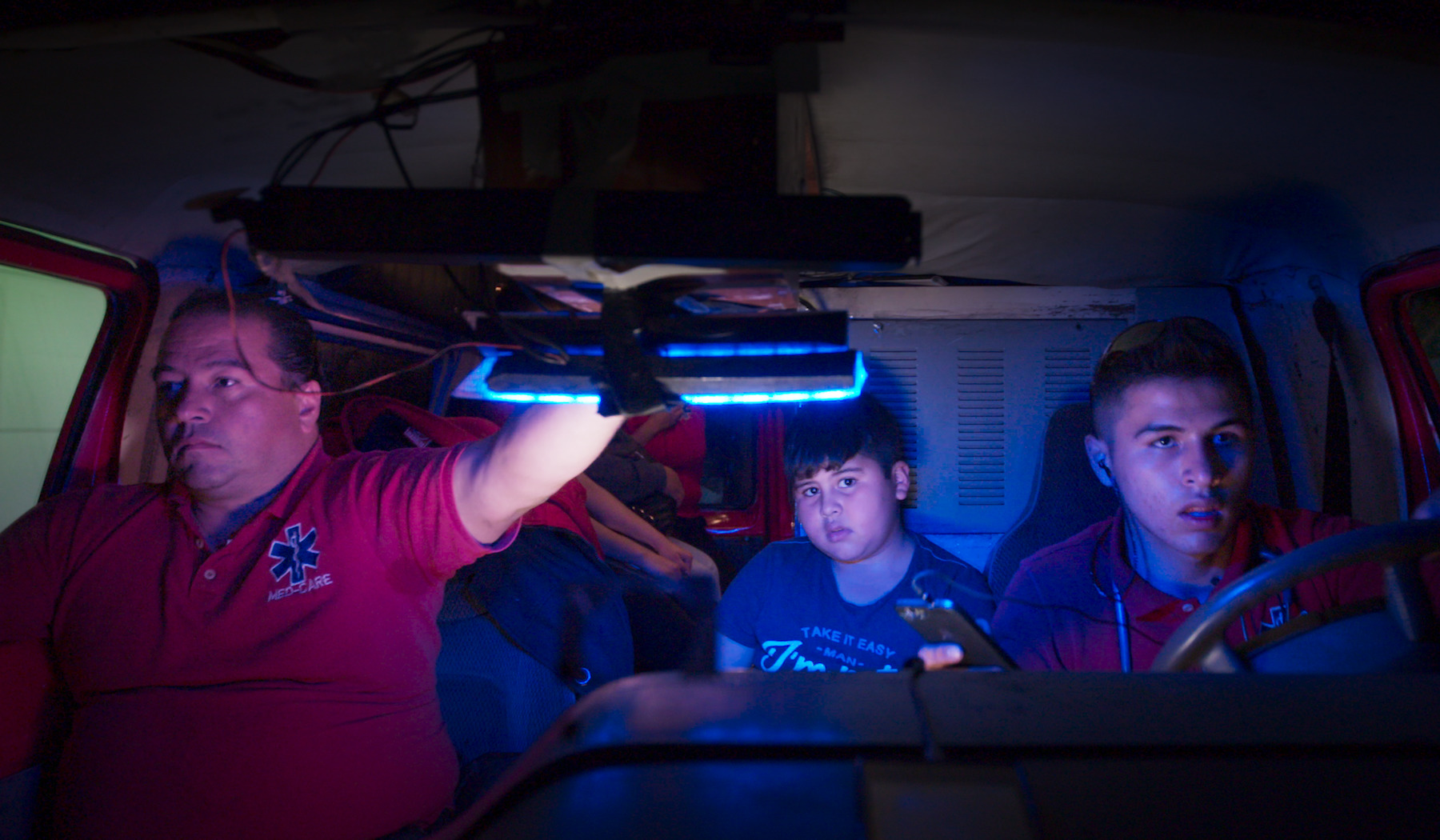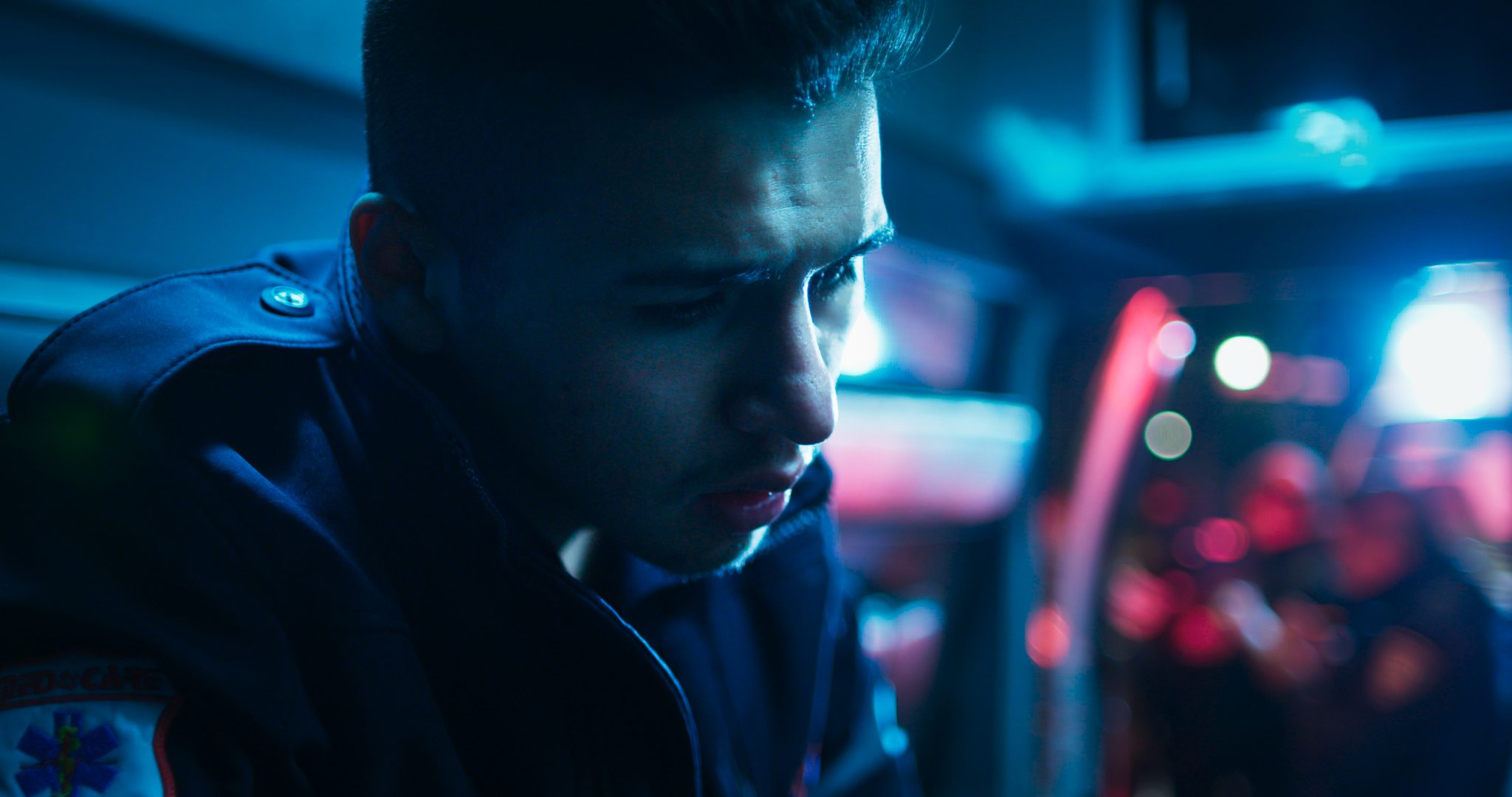

(Left to right) Fer Ochoa and his sons Josué Ochoa and Juan Ochoa driving in their ambulance, (Courtesy of 1091 Media)
Nonfiction narratives have a way of gripping you and leaving you aghast, in search of answers and even the truth, with a capital T. Such is the case in Luke Lorentzen’s new documentary feature Midnight Family. With standout vérité camerawork, the film follows the Ochoas, a family of paramedics who operate a private emergency ambulance in Mexico City. Lorentzen wants us to know that the family runs their business in a very dire ecosystem that he opens the film with the following lines: “In Mexico City, the government operates fewer than 45 emergency ambulances for a population of 9 million.” He presents the stakes right off the bat. No tiptoeing. No beating around the bush. The facts make it clear—every second counts. It’s a matter of life or death for the Ochoas everyday.
Contrasting the cutthroat environment is the well-intentioned Ochoa family, and at the center is the documentary’s star, 17-year-old Juan Ochoa. He’s the son of the family patriarch Fer, who’s more of a gruff and rough around the edges. Despite Juan’s young demeanor —always smiling showing his colorful braces, curling up at the back of the ambulance embracing a stuffed animal, and teasing his girlfriend on the phone— he commands the attention through his charm and no bullshit attitude. He’s attentive and communicates in a calm voice to patients. Owner of wit and street smarts, he isn’t afraid to tell his father or younger brother Josué off when he thinks they’re being incompetent. He’s the one who’s grounded and level-headed. Without him, there wouldn’t be an Ochoa family. But we also see another side to Juan: a regular 17-year-old boy whose morning routine consists of looking in the mirror and doing his hair. Looking presentable is important to him.


Juan Ochoa in his family’s ambulance. (Courtesy of 1091 Media)
The documentary is successful in capturing Juan’s moments of clinical professionalism in high-stress situations and his arresting vulnerability when he’s alone in front of the camera. There’s a moment in the film when he confesses not to understand why people refuse to pay for the services they provide. He says that if he were in their situation and was given the aid he needed, he would pay. No doubt. He adds, “I’d like to take just one night off to show people how screwed they’d be without us.” The city would be, and he knows it. Clearly, Juan is the epitome of a young man who had to grow up fast enough to bear the burden of the hustle.
Most of the footage we see on screen takes place at night. It adds to the underground, gritty feel of the —what at times could be described as a— shady for-profit private ambulance industry. Every night the Ochoas are in a literal drag race, competing with rival paramedics to get to the wounded. Who can get there the quickest? There’s no boundaries. In the middle of the mayhem, they curse, they bump the adjacent ambulance, they laugh, they holler, they feel the adrenaline rush. One ambulance must win while the other one is sidelined. Bottom line is the Ochoas have a good night only when they can successfully get a person on their stretcher, take them to the hospital, and charge them for their services.
Despite the valiant effort the Ochoas invest every night, they struggle to make ends meet. They carry a financial burden every night. Crucially, there’s a system that takes advantage of them. Almost always they receive tips about accidents from police officers. In turn, they have to give a cut of whatever money they make to them. Other officers, however, try to enforce rules that seem to be shot from the hip, and if private ambulances don’t abide by them, they ask to be compensated with money to not be reported. But it doesn’t stop there. The Ochoas also receive a cut from hospitals when they bring a patient in. Their world is full of brutal transactions and it alludes to the way the government views the lives of its citizens: merely disposable.
When watching the film, I wondered about the overall logistics that went into the execution of a flawless cinematography, which is also headed by Lorentzen himself. There’s a key moment in the film when the camera is in a static position and when a sudden notification about an accident pops up, the camera turns jittery and Lorentzen’s breaths are audible. During a post Q&A during the 2019 New Directors/New Films at Film at Lincoln Center, Lorentzen explained that moments like that were slim because a vast percentage of the time was spent in silence or small chit chat, just waiting for alerts to come in.
Lorentzen also makes the conscious decision not to make a trauma-heavy documentary. It could’ve been easy to fall into that trap, but he doesn’t. He could’ve easily filmed the blood and gore of accidents, people’s sadness. Behind the camera, he’s able to register victims’ agony and anxiety-induced moments without invading their space or taking advantage of their misery. Their faces are rarely on screen. That technique works in leaps and bounds.
More than exposing the precarious health care system of Mexico City, the film renders the fragility of those in moments of crisis and the glorious resilience of people caught in the web of a corrupt, dog-eat-dog world. You may think that the Ochoa family feeds into the system and that it enables it. You may think that they are making the best out of the situation. Or you may conclude that they are generally nice people whose —despite at times dubious ethical standings— are heroic figures.
The Ochoa family finds itself in a predicament: the fate of people’s lives lays on their hands. If something goes wrong, are they to blame?
How long would you last in an industry that seems to tear your soul slowly but steadily? Would you still know yourself? The documentary doesn’t have the answers, but looks at a family that seems to question that every day and somehow miraculously still makes it.
Midnight Family is playing at Metrograph in NYC now.
***
Luis Luna is Latino Rebels’ arts writer and associate producer of Latino Rebels Radio. He tweets from @luarmanyc.


